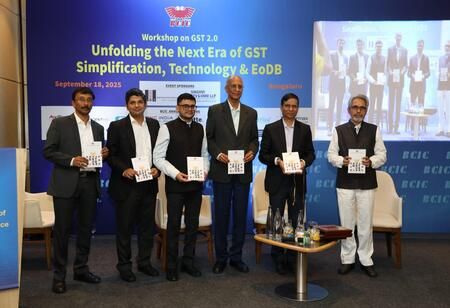
BCIC Workshop on GST 2.0 Highlights Structural Reforms, More


The Bangalore Chamber of Industry and Commerce (BCIC) successfully hosted its highly anticipated workshop, ‘GST 2.0 – Unfolding the Next Era of GST: Simplification, Technology & EODB,’ today in Bengaluru. The event brought together key policymakers, legal experts and industry leaders to discuss the transformative new phase of the Goods and Services Tax (GST) in India.
The workshop’s opening address was delivered by K Balasubramanian, Joint Secretary, Dept. of Revenue, Ministry of Finance, Government of India, who detailed the government’s comprehensive GST reforms.
"The government has announced broad GST reforms effective September 22, focusing on three pillars: structural reforms, rate rationalization and process improvements," Balasubramanian states.
Also Read: Jyothy Institute, LEO1 to Boost Student Financial Inclusion
He highlighted the focus on structural reforms to resolve long-standing issues, such as inverted duty structures in sectors like fertilizers and textiles, while also simplifying the tax code by consolidating the 12 percent bracket into a lower five percent merit rate and the 28 percent bracket (for non-cess items) to 18 percent. This rationalization, he noted, aims to "make aspirational goods affordable."
Following the keynote, a dynamic panel discussion took place with prominent experts, including DP Nagendra Kumar, IRS (former Member, GST, CBIC), G Shivadas, Senior Advocate and PV Srinivasan, Partner & Chief Mentor, PVS Advisors.
Nagendra Kumar provided a retrospective analysis, praising the system's success in achieving its foundational goals. "I think viewed from these three objectives behind introduction of GST, today we see a fair amount of success in achieving those objectives," he says.
Also Read: Will GST Reform Benefit the Common Man? Leaders Talk
"He emphasized that the significant growth in revenue, with monthly collections now reaching approximately Rs.1.85 lakh crores, is "purely on account of the economic efficiency of the tax collection" rather than rate increases".
"He concluded that "GST has been one of the very foundational structural reforms in the country."
The discussion then shifted to legal challenges, with Shivadas noting that the GST legal framework is still in its early stages. "I would say that the jurisprudence has not so much evolved in GST. Maybe we can expect it to happen in the next few years because you will have a tribunal like the GSTAT pronouncing its decision," he explained. Shivadas pointed out that a large portion of current litigation is unnecessary and that a fully functional GST Appellate Tribunal (GSTAT) will be crucial for establishing clear legal principles.
PV Srinivasan shared his perspective on the practical implications for the industry, especially regarding rate reductions. He raised concerns about managing accumulated credits and the potential for a surge in refund claims due to inverted duty structures. While acknowledging the government's intent, he stated, "The cost of compliance is better than the cost of evasion." He also criticized the complexity of the current registration process, arguing that it should be simplified to "only for identifying a taxpayer" rather than acting as a barrier. Srinivasan advised businesses to prepare for these changes, noting that while the policy intent is well-made, the implementation still has "a lot to be done."
Also Read: Teachers’ Day 2025: These Educators Are Reshaping Communities through Innovative Teaching Methods
Sunil Kumar Dhareshwar, EVP & Global Head – Taxation, Infosys Ltd. and Pramod Jain, CRO & CTO, Flipkart Group, enriched the workshop by sharing valuable industry perspectives. During the session, a jurisprudence handbook titled 'GST @ 8' was also released.
The workshop concluded with a consensus among participants that while GST has already brought about a monumental shift in India's tax landscape, the transition to GST 2.0 requires continued vigilance and collaboration. The new reforms are expected to drive a more simplified, technology-driven and business-friendly tax regime, ultimately benefiting both the economy and the consumer.